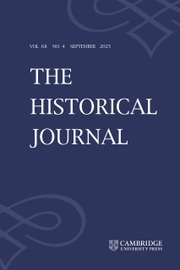(image source: Cambridge)
Abstract:
This article examines the role of the House of Lords as the high court from the Restoration of 1660 to the passage of the Appellate Jurisdiction Act in 1876. Throughout this period, lay peers and bishops judged appeals on civil law from the central courts of England and Wales, Ireland (aside from between 1783 and 1800), and Scotland after the Union of 1707. It has long been known that the revolution of 1688–9 transformed the ability of parliament to pass legislation, but the increased length and predictability of parliamentary sessions was of equal significance to the judicial functions performed by peers. Unlike the English-dominated profile of eighteenth-century legislation, Scots constituted the largest proportion of appellants between 1740 and 1875. The lack of interaction between Westminster and Scotland is often seen as essential to ensuring the longevity of the Union, but through comparing the subject matter of appeals and mapping the distribution of cases within Scotland, this article demonstrates the extent of Scottish engagement. Echoing the tendency of Scottish interests to pursue local, private, and specific legislation in order to insulate Scottish institutions from English intervention, Scottish litigants primarily sought to maintain and challenge local privileges, legal particularisms, and the power of dominant landowners.Read the article in full on Cambridge Core.


No comments:
Post a Comment